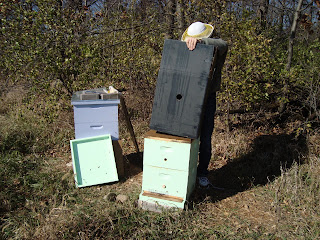After my goodbyes Ben proceeded, to place an absorbing wood board on top, and then slid a waxed cardboard carton over each hive to protect the honeybees against the frigid Northwest wind. He replaced the covers and put many rocks and bricks on them to make sure they will stay put. We then backed away, looked at the hives one more time wishing them well. We walked slowly to our car. That was it, the season was over. There is nothing else we can do for our precious honeybees. They are on their own, and we really wish them to be successful and be healthy and strong come next spring.
We repeated these last same steps in Shakopee. The golden Italian bees had returned to their own hive. The darker Carniolans were at peace in their own hive... they have fought an aggressive invasion in October, many died and they lost some honey. Hopefully they will have enough food to survive. I waved goodbye, and wished them well.
What an adventure it has been, and despite the ups and downs, the unknowns, and strange happenings; we enjoyed every minute of it. And along the way the bees taught us a lot: first of all they are a capable species that is combative, hard working and self reliant.
We wish to all our friends and families a good, safe and healthy winter. Thank you for being interested in bees. During the winter months I will be posting what we are doing and thinking for next year, and please if you have any questions, I would be happy to answer them.
"Bee" well,
Karine
In Chanhassen
In Shakopee
"crooked" to let the moisture escape.
Look at those 2 beekeepers....they look so proud!!!!
Karine at the Chanhassen apiary and Ben at the Shakopee apiary.










